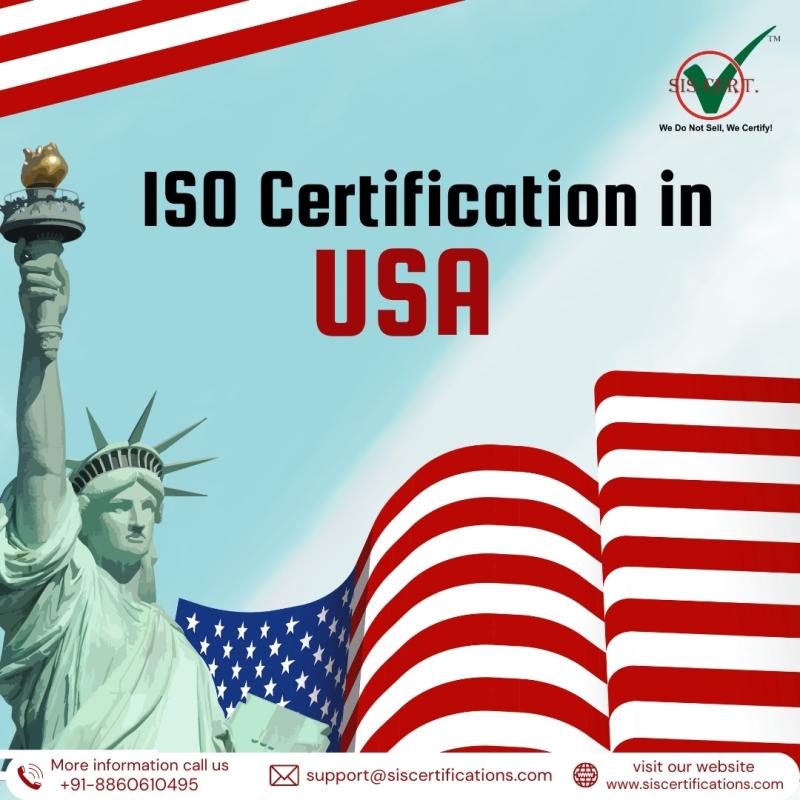ISO Certification in the USA: Your Complete Guide

In today’s globalized business environment, ISO certification has become a critical benchmark for companies aiming to demonstrate their commitment to quality, safety, environmental responsibility, and other key business aspects. While ISO standards are internationally recognized, obtaining ISO certification in the USA comes with unique benefits and considerations. In this blog, we’ll explore what ISO certification entails, its importance for businesses operating in the United States, and how to achieve it.
What Is ISO Certification?
ISO certification is an independent, third-party validation that a company’s management systems, processes, or products comply with internationally recognized standards developed by the International Organization for Standardization (ISO). These standards ensure consistency, efficiency, and customer satisfaction across various industries.
Popular ISO standards include:
ISO 9001: Quality Management Systems
ISO 14001: Environmental Management Systems
ISO 45001: Occupational Health and Safety Management Systems
ISO 27001: Information Security Management Systems
ISO 13485: Quality Management for Medical Devices
Why Is ISO Certification Important in the USA?
ISO certification offers significant advantages for businesses operating in the U.S. marketplace. Here’s why it matters:
1. Enhanced Credibility and Reputation
ISO certification demonstrates a company’s commitment to industry best practices. This builds trust with customers, business partners, and regulators.
2. Regulatory Compliance
In many industries, such as healthcare, manufacturing, and technology, adhering to ISO standards helps meet U.S. regulatory requirements, such as those set by the Food and Drug Administration (FDA) or Occupational Safety and Health Administration (OSHA).
3. Competitive Advantage
Certified organizations often outperform non-certified competitors by showcasing their focus on quality, safety, and sustainability. ISO certification can open doors to government contracts and partnerships with multinational companies.
4. Improved Operational Efficiency
ISO standards encourage businesses to optimize processes, reduce waste, and enhance overall performance, leading to cost savings and increased productivity.
5. Global Market Access
ISO certification facilitates entry into international markets by demonstrating adherence to globally recognized standards.
ISO Certification Process in the USA
Getting ISO certified involves several steps, which are consistent worldwide but may require specific adjustments to comply with U.S. regulations and practices.
Step 1: Choose the Relevant ISO Standard
Determine the standard that aligns with your business goals and industry requirements. For example:
Manufacturers may prioritize ISO 9001 for quality management.
Tech companies might focus on ISO 27001 for information security.
Step 2: Prepare Your Organization
Conduct a gap analysis to identify areas where your current processes fall short of the chosen ISO standard.
Develop and document a management system that aligns with the standard’s requirements.
Train employees on the processes and their roles within the system.
Step 3: Perform an Internal Audit
Evaluate the implementation of your management system through internal audits to identify and address any non-conformities.
Step 4: Engage a Certification Body
Select an accredited certification body in the USA, such as:
SIS Certifications
NSF International
Intertek
SGS
TÜV SÜD
These organizations will conduct a two-stage audit:
Stage 1: Review of documentation and preparedness.
Stage 2: On-site assessment to verify compliance.
Step 5: Maintain Certification
ISO certification is not a one-time achievement. Companies must undergo regular surveillance audits and recertification every three years to ensure continued compliance.
Industry-Specific Considerations for ISO Certification in the USA
Healthcare and Medical Devices
For businesses in healthcare or medical device manufacturing, ISO 13485 certification often complements FDA requirements. Adopting this standard helps meet regulatory expectations for quality and safety.
Technology and Data Security
With increasing concerns about cybersecurity, ISO 27001 has become essential for U.S.-based tech firms, especially those handling sensitive customer data or operating in cloud services.
Manufacturing
The U.S. manufacturing sector benefits significantly from ISO 9001, improving quality control and supply chain efficiency while meeting local and international customer demands.
Cost of ISO Certification in the USA
The cost of ISO certification varies based on factors like company size, complexity, and the chosen certification body. Typical costs include:
Preparation Costs: Training, documentation, and process improvements.
Certification Audit Fees: Vary by certification body and scope.
Ongoing Maintenance: Surveillance audits and recertification.
Small businesses can expect costs ranging from $5,000 to $20,000, while larger organizations may incur higher expenses.
ISO Certification Providers in the USA
When seeking certification, it’s essential to choose an accredited provider. Popular certifiers in the USA include:
- SIS Certifications
- BSI Group
DEKRA
TÜV Rheinland
PJR (Perry Johnson Registrars)
Verify their accreditation through bodies like ANAB (ANSI National Accreditation Board) to ensure credibility.
Conclusion
ISO certification in the USA is a powerful tool for businesses aiming to enhance their operations, meet regulatory requirements, and build trust with customers. Whether you’re in manufacturing, healthcare, technology, or any other industry, achieving ISO certification can unlock opportunities for growth and global recognition.
By committing to the principles of quality, safety, and sustainability, your business can gain a competitive edge and thrive in today’s demanding marketplace.
Post Your Ad Here

Comments